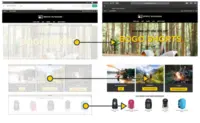Overview
What is Kibo eCommerce?
Kibo Software offers Kibo eCommerce (formerly Mozu), designed to support retailers with online offer creation and deployment, content publishing and landing pages, and many tools and widgets out of the box with a retail-oriented ecommerce solution. Mozu was acquired by Kibo…
Recent Reviews
Popular Features
- Mobile storefront (6)8.585%
- Product catalog & listings (6)8.383%
- Product management (6)8.282%
- Branding (6)8.282%
Pricing
Entry-level set up fee?
- No setup fee
Offerings
- Free Trial
- Free/Freemium Version
- Premium Consulting/Integration Services
Would you like us to let the vendor know that you want pricing?
29 people also want pricing
Alternatives Pricing
Features
Return to navigation
Product Details
- About
- Competitors
- Tech Details
- FAQs
What is Kibo eCommerce?
Kibo eCommerce is part of the company's Unified Commerce Cloud.
The Kibo eCommerce solution is a cloud-based platform described by the vendor as a feature-rich commerce technology, with an intuitive interface. Built with an API-first architecture, Kibo eCommerce offers extensibility & flexibility designed to simplify multi-site management of B2B & B2C channels & includes regular, "worry-free" platform updates. Kibo provides advanced merchandising tools, machine learning powered personalization, & content management capabilities out-of-the-box, while delivering mobile responsive sites for engaging shopping experiences.
Kibo eCommerce Features
Online Storefront Features
- Supported: Product catalog & listings
- Supported: Product management
- Supported: Bulk product upload
- Supported: Branding
- Supported: Search & filter
- Supported: Mobile storefront
- Supported: Product variations
- Supported: Subscriptions & downloads
- Supported: Website integration
- Supported: Visual customization
- Supported: CMS
Online Payment System Features
- Supported: PayPal integration
- Supported: Returns & refunds
- Supported: eCommerce security
- Supported: Credit card transaction fee
- Supported: B2B features
eCommerce Marketing Features
- Supported: Promotions & discounts
- Supported: Social commerce integration
- Supported: Customer registration
eCommerce Business Management Features
- Supported: Multi-site management
Kibo eCommerce Screenshots
Kibo eCommerce Competitors
Kibo eCommerce Technical Details
| Deployment Types | Software as a Service (SaaS), Cloud, or Web-Based |
|---|---|
| Operating Systems | Unspecified |
| Mobile Application | No |
Frequently Asked Questions
Kibo Software offers Kibo eCommerce (formerly Mozu), designed to support retailers with online offer creation and deployment, content publishing and landing pages, and many tools and widgets out of the box with a retail-oriented ecommerce solution.
Mozu was acquired by Kibo Software from Volusion in October 2016.
Salesforce Commerce Cloud, Adobe Commerce (Magento Commerce), and BigCommerce are common alternatives for Kibo eCommerce.
Reviewers rate CMS highest, with a score of 8.7.
The most common users of Kibo eCommerce are from Mid-sized Companies (51-1,000 employees).




